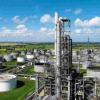I'm wondering what the typical industry standards of heat flux densities (W/sq in element loading) for an electric heater are.
I'm seeking densities for fluid medium of:
a.) produced water (chloride content of 17,000ppm) with dissolved oil.
b.) slop oil (SG would range from 0.73 to 0.76)
Regards,
SAprocessGD
Edited by SAprocessGD, 23 March 2012 - 07:49 PM.

 FB
FB











